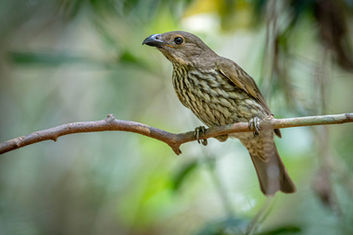
Birds With Altitude Project
Monitoring to understand the impacts of climate change
Many of our special Wet Tropics birds are in trouble. Research is mounting that many tropical bird species around the world are moving to higher elevations (altitudes) because of climate change. The problem is complex. In the Wet Tropics, the climate is changing, habitats and resources are shifting, but we lack information about some species’ population trends. Not enough is known about most species’ specific requirements to understand how or why climate change is affecting them. With your help, we can gather the data needed to help understand and take action to help Wet Tropics birds.


Reports
Each year a report is produced to share Wet Tropics bird population trends; distribution including in relation to altitudinal shift; and where possible, species’ specific factors and requirements. We sincerely thank all volunteers for their participation. Without you this important work would not be possible.
Volunteers needed
If you love bird watching and the tropical rainforest, are interested in learning and contributing to bird conservation, and if you live in the area or are traveling to the Wet Tropics (where 45% of Australia’s bird species are found), then this volunteering opportunity is for you.
We’re looking for birdwatchers to conduct 2-hectare, 20-minute search surveys or 500 metre area search surveys in the Wet Tropics – within the Wooroonooran Key Biodiversity Area (KBA), Atherton Tablelands KBA, Daintree KBA, Paluma KBA, and the Coastal Wet Tropics KBA.
As a Birds With Altitude volunteer, you will:
-
Choose survey sites identified in the Birds with Altitude manual, or at any publicly accessible and safe location within the Wooroonooran KBA (and/or Wooroonooran National Park within the KBA), Atherton Tablelands KBA, Daintree KBA, Paluma KBA, and the Coast Wet Tropics KBA. Survey sites at different elevations (altitude) are beneficial.
-
Visit the sites and monitor the birds using the BirdLife Australia standard 2-hectare, 20-minute search method, or the 500-metre area search method.
-
Record the name and number of birds you see and hear in Birdata.
-
A Birds With Altitude bird monitoring training manual (for Wooroonooran National Park) and a recorded presentation are available to provide guidance.
To undertake Birds With Altitude surveys, you need:
Binoculars
Ability to identify Wet Tropics birds and/or keenness to learn
A valid driver’s license and transport
To be responsible for your own safety and self-sufficiency


Birdata is the way we collaboratively and scientifically collect data to gain insight and protect Australia's birds. Sign up to start entering data immediately through the BirdLife Birdata app or website. It's so easy to become part of our national bird monitoring community and make your birding count!
Bowerbird monitoring
We have a long-term monitoring project to count the number of Tooth-billed Bowerbirds calling along 1 km transects in Wet Tropics. The bowerbirds will be calling October – December so any day early morning is a good time to have a walk. Or we have some group walks arranged. The idea is to see if there is any variation in bird numbers into the future caused by climate change. For more information and to register, contact Dominic Chaplin at dominic@pinecreekpictures.com.au or phone 0419 028 077.








